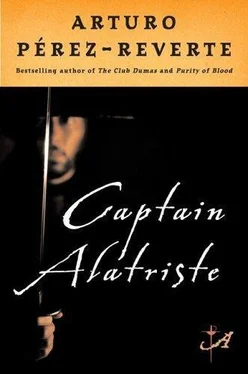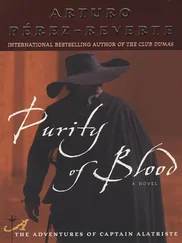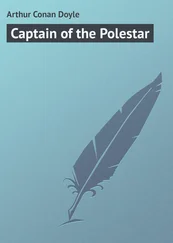Arturo Perez-Reverte - Captain Alatriste
Здесь есть возможность читать онлайн «Arturo Perez-Reverte - Captain Alatriste» весь текст электронной книги совершенно бесплатно (целиком полную версию без сокращений). В некоторых случаях можно слушать аудио, скачать через торрент в формате fb2 и присутствует краткое содержание. Жанр: Старинная литература, на английском языке. Описание произведения, (предисловие) а так же отзывы посетителей доступны на портале библиотеки ЛибКат.
- Название:Captain Alatriste
- Автор:
- Жанр:
- Год:неизвестен
- ISBN:нет данных
- Рейтинг книги:3 / 5. Голосов: 1
-
Избранное:Добавить в избранное
- Отзывы:
-
Ваша оценка:
- 60
- 1
- 2
- 3
- 4
- 5
Captain Alatriste: краткое содержание, описание и аннотация
Предлагаем к чтению аннотацию, описание, краткое содержание или предисловие (зависит от того, что написал сам автор книги «Captain Alatriste»). Если вы не нашли необходимую информацию о книге — напишите в комментариях, мы постараемся отыскать её.
Captain Alatriste — читать онлайн бесплатно полную книгу (весь текст) целиком
Ниже представлен текст книги, разбитый по страницам. Система сохранения места последней прочитанной страницы, позволяет с удобством читать онлайн бесплатно книгу «Captain Alatriste», без необходимости каждый раз заново искать на чём Вы остановились. Поставьте закладку, и сможете в любой момент перейти на страницу, на которой закончили чтение.
Интервал:
Закладка:
Then, along with the clatter of the swords, the captain
heard a moan, and saw the shadow of the younger Englishman slip down the wall. He seemed to be wounded, defending himself, on one knee, with greater and greater difficulty. That distracted Alatriste's adversary, and he abandoned his instinct for survival and the skill with which, up to that moment, he had defended himself.
Parrying a thrust, he shouted, "Mercy for my friend," in an elementary, strongly accented Spanish. And again, "Mercy for my friend!"
He had dropped his guard slightly, and at his first careless instant, the captain, after a feint with the dagger, easily disarmed him. Pardiez, the heretic's balls are hung right, he thought. What the devil was this business of asking for mercy for the other man when he himself was about to give up the ghost? The foreigner's sword was still flying through the air when Alatriste pressed the tip of his own to the young man's throat, and drew back his elbow slightly, which he needed to do in order to obtain the best line for his thrust. Do away with him once and for all. Mercy for my friend, indeed. The man had to be a bit dim, or English, to shout something like that in a dark lane in Madrid, with swords flashing all around him.
Then the Englishman repeated his strange behavior. Instead of asking for mercy for himself—it was clear that he was brave—or trying to pull out the useless poniard still at his waist, he threw a desperate look toward his companion, who was weakly defending himself on one knee, and again cried to Diego Alatriste, "Mercy for my friend!"
The captain held up for a moment, bewildered. This blond youth with the carefully tended mustache, long hair—tousled, it was true, from travel—his elegant gray suit covered with dust, feared only for his friend, who was at the point of being dispatched by the Italian. Only at that moment, in the light of the lantern faithfully illuminating the scene of combat, did Alatriste allow himself to truly look at the Englishman: blue eyes; pale, finely modeled face contorted by anguish that was palpably not fear of losing his own life. Soft white hands. All marks of an aristocrat. Everything shouted breeding. And that, the captain told himself quickly, as he reviewed his conversation with the masked men—the wish of one not to have much blood, and the insistence of the other, backed by the Inquisitor Bocanegra, to murder the travelers—began to light too many dark corners for him to do away with this man and still live in peace.
So shit. A shithouse of shit. God damn him! And all the powers of night and devils of Hell! Still with his sword pressed to the Englishman's throat, Diego Alatriste hesitated, and his victim realized he was hesitating. Then, with a gesture of supreme nobility, incredible in his situation, he looked into Alatriste's eyes and slowly placed his hand on his breast, over his heart, as if he were making a solemn oath, not a plea. "Mercy."
He asked for the last time, almost confidentially, in a low voice. And Diego Alatriste, who was still calling on all the demons, knew that now he could not kill the accursed Englishman in cold blood, at least not that night, in that place. And he also knew, as he lowered his sword and turned toward the Italian and the other youth, that he was on the verge, complete imbecile that he was, of walking into yet one more trap in his eventful life.
It was clear that the Italian was doing very well. He could have killed the wounded man any number of times, but he was satisfied to harass him with false lunges and feints, as though he were enjoying delaying the thrust home. He resembled a thin black cat toying with a mouse before sinking its claws into it. At his feet, knee on the ground and back against the wall, one hand clutching the wound bleeding through his clothing, the younger Englishman was trying not to faint, and barely parrying his adversary's attacks. He did not ask for mercy; instead, his face, mortally pallid, showed dignified determination; his teeth were clenched, and he was resolved to die without crying out or moaning. "Leave off!" Alatriste shouted to the Italian. Between thrusts, the captain's cohort looked at him, surprised to see him beside the second Englishman, who was disarmed and still standing. The attacker hesitated an instant, looked back at his subjected opponent, made a half-hearted feint, and again looked toward the captain.
"Is that a jest?" he asked, stepping back to catch his breath, as he whipped his sword through the air, right and left.
"Leave off," Alatriste insisted.
The Italian stared at him open-mouthed, unable to believe what he had just heard. In the dying light of the lantern, his pockmarked face looked like the surface of the moon. His black mustache twisted into a sinister smile, revealing his gleaming white teeth.
"Don't fuck this up now," the Italian said finally.
Alatriste took one step toward him, and the Italian looked at the sword in his hand. On his knee, uncomprehending, the wounded youth shifted his eyes from one to the other.
"There is more to this than we thought," the captain stated. "So we will kill them another day."
The Italian stared even harder. His smile grew wider and more incredulous, and then disappeared. He shook his head.
"You are mad," he said. "This could cost us our necks." "I will take the responsibility."
"So?"
The Italian seemed to be thinking it over. Then, with the speed of a comet, he lunged at the Englishman with a thrust so forceful that had Alatriste not blocked his sword it would have pinned the youth to the wall. Stymied, the black-clad figure whirled toward the captain with an oath, and this time it was Alatriste who had to call on his instincts as a swordsman to fend off a second thrust, which came within a hair of the site of his heart. The Italian had attacked with the most vicious intentions in the world.
"We will meet again!" he cried. "Somewhere."
And kicking over the lantern as he ran, the Italian disappeared into the darkness of the street, again a shadow among shadows. From far away, his laugh echoed for an instant, like the worst of auguries.
V. THE TWO ENGLISHMEN
The younger man was not seriously wounded. His companion and Diego Alatriste had carried him closer to the lantern, which they lighted again. There they propped him against the Carmelites' garden wall and examined the knife wound he had received. It was a superficial cut that bled freely but was of no great consequence, the much-favored kind that allowed young dandies to strut before the ladies with an arm in a sling, at very little cost.
The man in the gray suit placed a clean handkerchief over the wound, which was beneath the left armpit, and then buttoned his friend's shirt and doublet, all the while speaking softly in their own tongue. During this procedure, which the Englishman performed with his back turned to Alatriste, as if he no longer feared anything from him, the captain had the opportunity to mull over certain
interesting details. For example: Belying the apparent calm of the youth in gray, his hands were trembling as he opened his companion's clothing to ascertain the gravity of the wound. Also, although the captain knew only a few words of English, those shouted from one ship to another or from parapet to parapet in battle—a veteran soldier's vocabulary, limited to Fockyou, sunsa beechez, and We gon eslice off yu balls— the captain could hear that the gray-clad man addressed his companion with a kind of affectionate respect. Further, though the injured man had called him Steenie, which was undoubtedly a friendly and familiar name or nickname, the latter used the formal "Milord" when speaking to the younger man. There was a cat in the creamery, here, but not exactly an alley cat: a purebred Angora.
Читать дальшеИнтервал:
Закладка:
Похожие книги на «Captain Alatriste»
Представляем Вашему вниманию похожие книги на «Captain Alatriste» списком для выбора. Мы отобрали схожую по названию и смыслу литературу в надежде предоставить читателям больше вариантов отыскать новые, интересные, ещё непрочитанные произведения.
Обсуждение, отзывы о книге «Captain Alatriste» и просто собственные мнения читателей. Оставьте ваши комментарии, напишите, что Вы думаете о произведении, его смысле или главных героях. Укажите что конкретно понравилось, а что нет, и почему Вы так считаете.










